Diplomatic Bluebook 2025
Chapter 2
Japan's Foreign Policy by Region
2 Regional Organizations
In addition to the Community of Latin American and Caribbean States (CELAC),(1) the Organization of American States (OAS), and the Forum for East Asia-Latin America Cooperation (FEALAC), the following regional organizations in the LAC region conduct policy coordination on various issues.
- (1) CELAC: Comunidad de Estados Latinoamericanos y Caribeños (Community of Latin American and Caribbean States)
(1) Pacific Alliance
The Pacific Alliance (composed of Chile, Colombia, Mexico, and Peru; hereafter referred to as “PA”) aims to promote free mobility of goods, services, and more within the region and to build a foundation for expansion into the Asia-Pacific region. Singapore is an Associated State to the PA. Japan is an Observer State and places importance on cooperation with the group as it shares common values and principles.
(2) Common Market of the South (MERCOSUR)(2)
In August, with the entry into force of the Protocol of Accession of Bolivia to MERCOSUR, Bolivia joined MERCOSUR alongside Argentina, Brazil, Paraguay, and Uruguay. (Venezuela is a member but is currently suspended.)
With a few exceptions, tariffs have been eliminated for all goods traded within the MERCOSUR region.
Regarding free trade agreements (FTAs), negotiations are ongoing with countries such as the Republic of Korea (ROK) and Canada. In July, negotiations were launched with the United Arab Emirates, and in December, an agreement was reached in the negotiations with the European Union (EU).
In relation to Japan, the Fifth Dialogue to Strengthen the Economic Relationship between Japan and Mercosur was held in Paraguay in April for the first time in seven years. In November, during a summit meeting between Prime Minister Ishiba and President Lula of Brazil, the two leaders agreed to work together to discuss the Japan-MERCOSUR Strategic Partnership Framework (tentative name) as a forum for discussing win-win cooperation between the two sides in a wide range of areas, including trade and investment.
- (2) MERCOSUR: Mercado Común del Sur (Southern Common Market)
(3) Caribbean Community (CARICOM)(3)
CARICOM was founded by 14 Caribbean nations for economic integration and foreign policy coordination. It has a large presence in the international arena due to its coordinated actions. Although CARICOM countries include many countries with relatively high incomes, they are threatened by natural disasters such as catastrophic hurricanes almost every year and also face vulnerabilities particular to small island states due to the small size of their populations and economies.
Japan is leading its diplomacy in accordance with the three pillars for Japan-CARICOM cooperation. Japan is also providing support to high-income level countries based on their development needs and economic capabilities. Cooperation progressed in 2024, designated as Japan-CARICOM Friendship Year 2024, including the Eighth Japan-CARICOM Ministerial-Level Conference.
In Haiti, since the assassination of the president in 2021, political instability has led to stagnation of administrative and legislative functions, and the humanitarian situation for the population has worsened due to the influence of armed groups (gangs). In response, in June, at the request of the Government of Haiti, a Multinational Security Support Mission began operations based on a UN Security Council resolution. In light of the dispatch of this mission, Japan decided to provide an additional 17 million U.S. dollars in support aimed at improving the security and humanitarian situation.
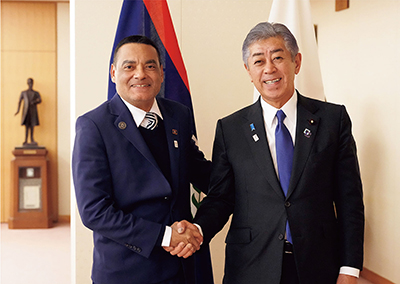 Japan-Belize Foreign Ministers' Meeting (December 14, Tokyo)
Japan-Belize Foreign Ministers' Meeting (December 14, Tokyo)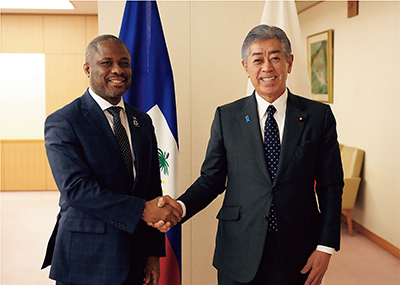 Japan-Haiti Foreign Ministers' Meeting (December 13, Tokyo)
Japan-Haiti Foreign Ministers' Meeting (December 13, Tokyo)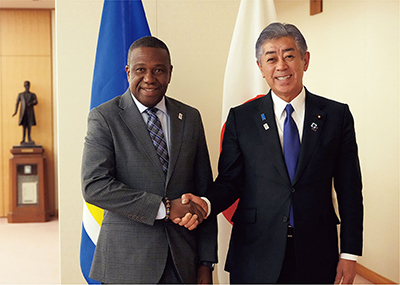 Japan-Saint Lucia Foreign Ministers' Meeting (December 14, Tokyo)
Japan-Saint Lucia Foreign Ministers' Meeting (December 14, Tokyo)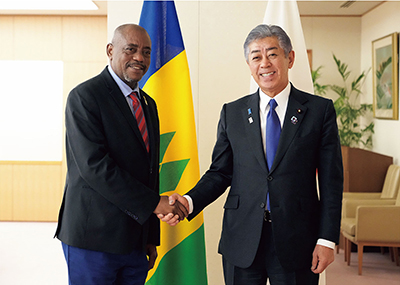 Japan-Saint Vincent and the Grenadines Foreign Ministers' Meeting (December 14, Tokyo)
Japan-Saint Vincent and the Grenadines Foreign Ministers' Meeting (December 14, Tokyo)- (3) CARICOM: Caribbean Community (Member countries: Antigua and Barbuda, Guyana, Grenada, Jamaica, Suriname, Saint Christopher and Nevis, Saint Vincent and the Grenadines, Saint Lucia, Dominica, Trinidad and Tobago, Haiti, Bahamas, Barbados, and Belize)
■Japan-CARICOM Friendship Year 2024
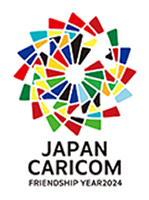 Logo for Japan-CARICOM Friendship Year 2024
Logo for Japan-CARICOM Friendship Year 2024The year 2024 was celebrated as the strengthening of cooperative relations between Japan and Caribbean countries (See the Opening Special Feature). Because 2024 marked the 30th anniversary of the start of the Japan-CARICOM (Caribbean Community) Consultations, as well as the 60th anniversary of the establishment of diplomatic relations between Japan and both Jamaica and Trinidad and Tobago, it was designated as “Japan-CARICOM Friendship Year 2024.” Commemorative events were held in both Japan and CARICOM member states through public-private cooperation, deepening mutual understanding.
■High-Level Exchanges
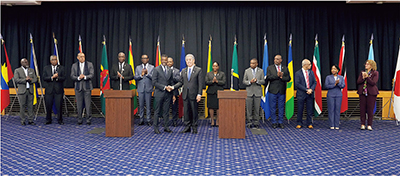 Foreign Minister Iwaya shakes hands with Foreign Minister Vince Henderson of Dominica (Co-chair) and foreign ministers of CARICOM member states (December 14, Tokyo)
Foreign Minister Iwaya shakes hands with Foreign Minister Vince Henderson of Dominica (Co-chair) and foreign ministers of CARICOM member states (December 14, Tokyo)In February, Minister of Foreign Affairs and Foreign Trade Kamina Johnson Smith of Jamaica visited Japan as a guest of the Ministry of Foreign Affairs (MOFA). In March, Secretary-General of the CARICOM Carla Natalie Barnett visited Japan upon the invitation of MOFA. In December, which marked the conclusion of the Friendship Year, representatives from 14 CARICOM member states and the CARICOM Secretariat gathered in Tokyo to participate in the Japan-CARICOM Ministerial-Level Conference, which resulted in the issuance of the Ministerial Joint Statement. Foreign ministers from 12 CARICOM member states attended and held bilateral meetings with Foreign Minister Iwaya, making 2024 a year of active high-level exchanges. In 2025 as well, mutual visits by dignitaries are scheduled, and Japan will continue to strengthen its relations with the Caribbean countries.
■Cooperation Between Japan and CARICOM Member States
The presence of CARICOM member states is growing, as they make up about 7% of the United Nations member states and play important roles in the international arena.
Japan and CARICOM member states have steadily expanded and deepened their cooperative relationship under the three pillars announced in 2014: (1) Cooperation towards sustainable development; (2) Expanding fraternal bonds of cooperation and friendship; and (3) Cooperation in the international arena.
Meanwhile, over the past ten years, the environment surrounding Japan and CARICOM member states has completely changed. Intensifying global issues such as climate change have become more severe, and the free and open international order based on the rule of law that Japan and CARICOM member states have jointly upheld is now facing open challenges.
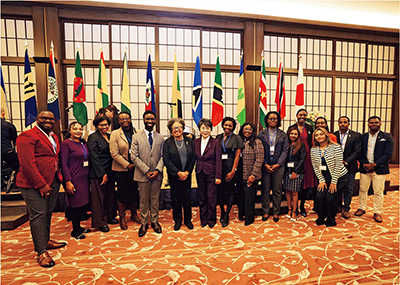 Japan–CARICOM Friendship Year Reception (March 26, Iikura Guest House, MOFA, Tokyo)
Japan–CARICOM Friendship Year Reception (March 26, Iikura Guest House, MOFA, Tokyo)Amid such circumstances, it is increasingly important to strengthen relations with CARICOM member states, which have a strong sense of responsibility in addressing global issues. Although geographically distant, Japan and CARICOM member states will continue to promote cooperation in the international arena, coordination of bilateral policies, strengthening of economic relations, development cooperation, and people-to-people exchanges, under their global partnership based on shared values and principles.
(4) Central American Integration System (SICA)(4)
SICA was established in 1992 with the aim of promoting regional economic and social integration and achieving peace, freedom, democracy, and development. Its eight member countries are El Salvador, Guatemala, Costa Rica, Nicaragua, Panama, Belize, Honduras, and the Dominican Republic.
Since 1995, Japan has held policy consultations with SICA member countries through the Japan-Central America Forum for Dialogue and Cooperation. Since 2010, Japan has served as an external observer and held high-level dialogue with SICA.
- (4) SICA: Sistema de la Integración Centroamericana

